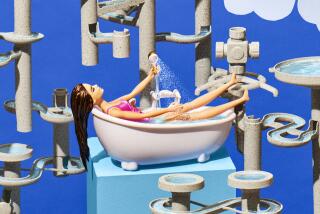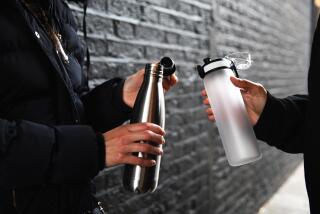For years we’ve been admonished to chug eight glasses of water a day--for our skin, for our weight, for general good health. But--surprise!--experts say that advice is simply...
Talk about a drinking problem.
On the one hand, it seems that more people than ever are drinking heavily: College students bring bottles into classrooms; office workers nip from jugs all day long. Many of us are like Gerri Johnson, a 56-year-old kindergarten teacher living in Manhattan Beach, who says, “I carry a bottle of water throughout the day, and I’m always drinking. It flushes out my body, and it’s good for my skin.”
At the same time, some nutritionists insist that half the country is walking around dehydrated. We drink too much coffee, tea and sodas containing caffeine, which prompts the body to lose water, they say; and when we are dehydrated, we don’t know enough to drink.
Can it be so? Should healthy adults really be stalking the water cooler to protect themselves from creeping dehydration?
Not at all, doctors say. “The notion that there is widespread dehydration has no basis in medical fact,” says Dr. Robert Alpern, dean of the medical school at the University of Texas Southwestern Medical Center in Dallas.
Doctors from a wide range of specialties agree: By all evidence, we are a well-hydrated nation. Furthermore, they say, the current infatuation with water as an all-purpose health potion--tonic for the skin, key to weight loss--is a blend of fashion and fiction and very little science.
Consider that first commandment of good health: Drink at least eight 8-ounce glasses of water a day. This unquestioned rule is itself a question mark. Most nutritionists have no idea where it comes from. “I can’t even tell you that,” says Barbara Rolls, a nutrition researcher at Pennsylvania State University, “and I’ve written a book on water.”
Some say the number was derived from fluid intake measurements taken decades ago among hospital patients on IVs; others say it’s less a measure of what people need than a convenient reference point, especially for those who are prone to dehydration, such as many elderly people.
Kidney specialists do agree on one thing, however: that the 8-by-8 rule is a gross overestimate of any required minimum. To replace daily losses of water, an average-sized adult with healthy kidneys sitting in a temperate climate needs no more than one liter of fluid, according to Jurgen Schnermann, a kidney physiologist at the National Institutes of Health.
One liter is the equivalent of about four 8-ounce glasses. According to most estimates, that’s roughly the amount of water most Americans get in solid food. In short, though doctors don’t recommend it, many of us could cover our bare-minimum daily water needs without drinking anything during the day.
“Whenever I go to the airport I see all these people carrying around bottles of water, and I wonder, ‘What’s behind this?’ ” says Schnermann. “Certainly not science.”
Try confusion. The way it’s almost always stated, in books, magazines and newspapers, the 8-by-8 rule specifically discounts caffeinated beverages, such as coffee. This is flat wrong. Caffeine does cause a loss of water, but only a fraction of what you’re adding by drinking the beverage. In people who don’t regularly consume caffeine, for example, researchers say that a cup of java actually adds about two-thirds the amount of hydrating fluid that’s in a cup of water.
That is to say, one cup of coffee equals about two-thirds a cup of water--if you’re not a regular caffeine drinker.
Regular coffee and tea drinkers become accustomed to caffeine and lose little, if any, fluid. In a study published in the October issue of the Journal of the American College of Nutrition, researchers at the Center for Human Nutrition in Omaha measured how different combinations of water, coffee and caffeinated sodas affected the hydration status of 18 healthy adults who drink caffeinated beverages routinely.
“We found no significant differences at all,” says nutritionist Ann Grandjean, the study’s lead author. “The purpose of the study was to find out if caffeine is dehydrating in healthy people who are drinking normal amounts of it. It is not.”
The same goes for tea, juice, milk and caffeinated sodas: One glass provides about the same amount of hydrating fluid as a glass of water. The only common drinks that produce a net loss of fluids are those containing alcohol--and usually it takes more than one of those to cause noticeable dehydration, doctors say.
Do the Math: We’re Drinking Plenty
Now, take a close look at a survey released this May by the International Bottled Water Assn. Based on interviews with 2,818 adults in 14 U.S. cities, the association concluded that “although an overwhelming majority of Americans know that drinking water enhances health, most don’t drink as much per day as they should.”
Yet, according to the association’s own numbers, Americans say they drink an average of 6.1 glasses of water, 3.7 servings of soda or sports drinks, 3.2 of coffee and tea, 1.9 of juice, 1.7 of milk, and one alcoholic drink each day.
All told, after subtracting the alcoholic drink, that’s a sopping 15 glasses of hydrating fluids, well above the already exaggerated “minimum.” And it doesn’t even include the three or four glasses contained in solid food.
What do we do with all this excess water? Ask any water junkie who’s tried to sit through a movie lately: We run to the bathroom.
For some people, drinking plenty of water is a very good idea. As we age, for example, many of us grow less sensitive to losses of body water and don’t drink when we should. Developing a water habit is a good precaution against dehydration. In addition, researchers have good evidence that people who develop kidney stones can lower their risk of further problems by drinking more fluids. “Those are the only patients we would tell to drink more water,” says Alpern.
But there are also people for whom guzzling water is dangerous. According to Dr. Gary Robertson, who studies water metabolism at Northwestern University Medical School in Chicago, these are patients whose bodies have trouble eliminating fluids--for example, those with diabetes who are taking anti-diuretic hormone, or ADH, which prevents the body from losing water. “The excess water cannot be excreted,” he says, “and the result is water intoxication, which produces symptoms ranging from mild headache to confusion, coma, seizures and occasionally even death.”
Increasingly, says Robertson, doctors are prescribing ADH for conditions such as nocturia, a persistent need to urinate at night, which ruins sleep in many elderly people; and bed-wetting, in both older adults and children. He’s aware of one case already in which a diabetic woman taking ADH died of water intoxication after following the advice of an article discussing the health benefits of water.
Of course, if you’re healthy, and you’re laboring over the stair machine, playing basketball, or even gardening in a hot, dry climate, you’re going to need a lot more than a liter to keep you hydrated. But you hardly need a nutritionist or a doctor to tell you that.
“You’re dying of thirst,” says Alpern. “The thirst mechanism is one of the most powerful and sensitive of all the body’s regulatory processes.”
Thirst Is Your Best Indicator
Robertson says that this mechanism almost always kicks in when we’ve lost between 1% and 2% of body water. “There’s no evidence that this 1 to 2% decrease is harmful in any way,” he says. “Thus, there is really no need to ‘prevent’ this slight decrease in body water by drinking a specified amount in the absence of thirst.”
What if you’re sweating and for some reason don’t or can’t drink? That’s when the body will begin to squeeze water from its own tissues, including the brain and the skin. And that’s why you may get a headache when dehydrated, and why your skin can look ragged and dry. A tall, cool glass of water or soda or iced tea will soothe your head and revive your skin, in most cases, doctors say--but only if you’re dehydrated to start with.
“If you’re a normally hydrated person, like you or me,” says Dr. David Rish, a dermatologist in Beverly Hills, “then drinking extra water is not going to do anything for your skin. If your skin is dry, and you’re hydrated, the best thing to do is apply lotion.”
Using Water as a Diet Aid
Perhaps most cruelly of all, there’s no good evidence that drinking water significantly curbs appetite. “I think that’s mostly an invention of the diet industry,” says Carolyn Katzin, a nutritionist in Brentwood who runs the American Cancer Society’s nutrition program in California. “A better way to get water is in fruits and vegetables.”
A couple of liters of drinking water certainly fill the stomach, researchers say. But you’re just as hungry shortly thereafter; and once all that water flows under the bridge, you tend to eat as many calories as you would have without guzzling.
Barbara Rolls, the Pennsylvania State researcher, says water can help you eat fewer calories--as long as it’s cooked into food. In a 1999 study, Rolls tallied how many calories 24 healthy adult women ate when served a lunch of chicken and rice. When the chicken and rice were prepared as a casserole and served with a glass of water, the women consumed an average of 392 calories each. When the rice, chicken and water were cooked together into a soup, the women ate an average of only 289 calories each. “And they did not make up for those calories by eating more at dinner,” says Rolls.
“This is really the way the body is engineered to get water--in food, in soup, in fruits and vegetables, which are almost all water,” says UCLA psychologist William McCarthy, who’s also director of science at the Pritikin Longevity Center in Santa Monica. “When we get water in this food matrix, it stays with us for a while. Whereas when we drink liquid water, it goes right through the body. I see all these people carrying around their water bottles like talismans to protect them from disease and weight gain. Well, lots of that water is going into the stomach--and right out.”
Not that it’s doing any mischief in healthy adults along the way. “You know, I get patients in my office all the time, saying, ‘I’ve been real good, doc, I’m drinking seven glasses of water a day,’ ” says Alpern. “And I leave them alone. It’s certainly not doing them any harm, and it’s a lot better than other habits they could have.”
So relax, doctors say. Forget the diet books. And listen to your own body. Says Ann Grandjean: “Look, if you’re running to the bathroom so much it seems like you can’t get any work done, you’re drinking too much. And if you’re going less than four times a day, you’re probably drinking too little.”


